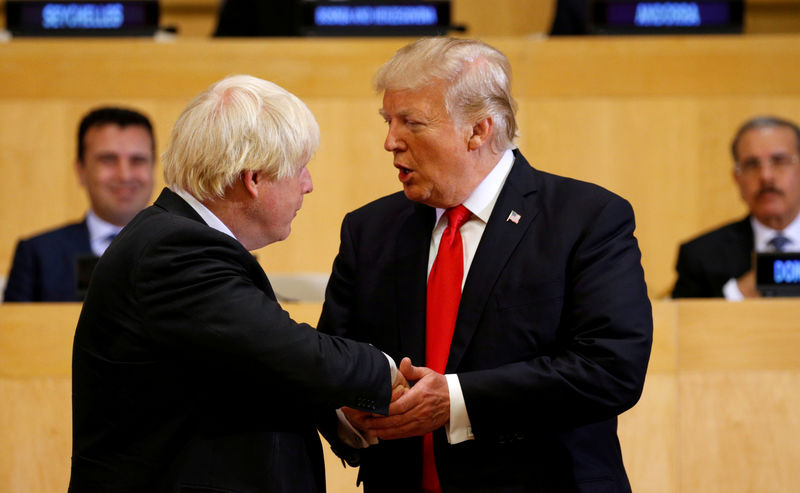By Steve Holland
WASHINGTON (Reuters) - They have signature strawberry blonde hair styles. They like to throw rhetorical bombs with little regard for the political consequences. And they both have a celebrity style that generates headlines.
In Boris Johnson, U.S. President Donald Trump may be getting the brash British prime minister he wanted after Trump made up his mind that Theresa May was a hapless leader for failing to deliver a credible Brexit deal.
Trump appeared poised to quickly extend an invitation to Johnson to visit the White House once he takes over as prime minister on Wednesday after winning the Conservative Party leadership. They spoke on the phone last week.
"I like Boris Johnson. I always have," Trump told reporters on Friday. "He's a different kind of a guy, but they say I'm a different kind of guy too. I think we'll have a very good relationship."
On Tuesday, the Republican president said the British were calling Johnson "Britain Trump."
"People are saying that's a good thing, that they like me over there. That's what they wanted. That’s what they need," Trump, 73, told a political youth group.
Suddenly, the two provocateurs will be the caretakers of the "special relationship" between the United States and the United Kingdom that has stood the test of time and underpinned one of the strongest military and diplomatic alliances in the West.
With Johnson at the helm, Trump is looking to "strengthen the special relationship between our two countries," a senior administration official said.
Trump made repeated attempts to give May advice on Britain's departure from the European Union, a bloc he frequently derides.
He said May had done "a very bad job" and "I think Boris will straighten it out."
Johnson, 55, has promised to complete Brexit on Oct. 31 with or without a deal, even though lawmakers say they will bring down any government that tries to leave without one.
MAY'S 'MINI-LECTURES' TO TRUMP
Despite their different backgrounds - Johnson is from a connected British family and went to elite schools and Trump was raised in the New York borough of Queens and dealt in real estate - they have similar approaches to the world.
"Both are populistic, nationalistic, and both are very disruptive forces and relish in their disruption," said Heather Conley, a European expert at the Center for Strategic and International Studies.
"I think they definitely know how to knock the blocks down. What both suffer from is knowing how to build things after the blocks are knocked down."
Privately, Trump had long since grown weary of dealing with May, a former senior administration official said.
"She would call him and give him mini-lectures," said the former official, who spoke on condition of anonymity. "'Donald, can you be more careful with your language?' He found it tedious I think it's safe to say."
Trump will likely judge Johnson's early tenure on whether he can deliver a Brexit deal.
Fireworks could erupt in other areas as well.
Britain has preferred to support the European Union's approach to reining in Iran's nuclear program. Trump pulled the United States out of the 2015 deal last year and has ratcheted up sanctions to try to devastate Tehran's economy, a possible factor in Iran's seizure of a British tanker in the Strait of Hormuz in recent days.
Trump has always wanted Britain to limit dealings with Chinese telecommunications company Huawei and former foreign minister Johnson has to decide whether to include it in the U.K.'s 5G telecoms network.
Beyond those issues, Trump and Johnson will have to hammer out a U.S.-Britain free trade agreement seen as crucial to help Britain's post-Brexit economy.
Johnson, who was born in New York, first made his mark in Trump's world when the then-London mayor visited Trump Tower in January 2017, days before Trump took over as president, and met Trump advisers Jared Kushner, Steve Bannon and Michael Flynn.
He has avoided drawing the president's fire on Twitter despite making critical remarks about Trump in the past - calling him "unfit" to be the president and "clearly out of his mind" for proposing a ban on Muslims entering the United States when he was a presidential candidate in December 2015.
More recently, Johnson showed his reluctance to antagonize Trump when he failed to defend British Ambassador Kim Darroch after diplomatic memos in which Darroch described Trump's administration as "inept" were leaked to a newspaper. Johnson acknowledged his lack of support was a factor in the envoy's resignation from the post in Washington.
Dave Bossie, a top adviser to Trump during his 2016 presidential campaign, said Johnson's entry offers the chance to turn the page from the "strained friendship" of recent years.

"I’m hopeful that the new prime minister will want to foster the greatest alliance and friendship that exist between two countries, the United States and Great Britain," he said.